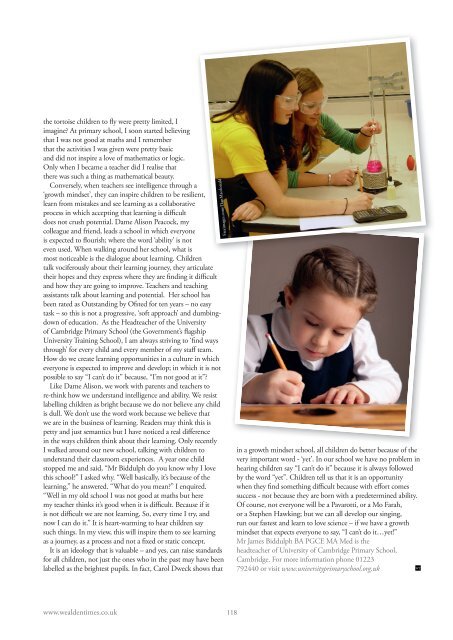Surrey Homes | SH17 | March 2016 | Fashion supplement inside
The lifestyle magazine for Surrey - Inspiring Interiors, Fabulous Fashion, Delicious Dishes
The lifestyle magazine for Surrey - Inspiring Interiors, Fabulous Fashion, Delicious Dishes
You also want an ePaper? Increase the reach of your titles
YUMPU automatically turns print PDFs into web optimized ePapers that Google loves.
the tortoise children to fly were pretty limited, I<br />
imagine? At primary school, I soon started believing<br />
that I was not good at maths and I remember<br />
that the activities I was given were pretty basic<br />
and did not inspire a love of mathematics or logic.<br />
Only when I became a teacher did I realise that<br />
there was such a thing as mathematical beauty.<br />
Conversely, when teachers see intelligence through a<br />
‘growth mindset’, they can inspire children to be resilient,<br />
learn from mistakes and see learning as a collaborative<br />
process in which accepting that learning is difficult<br />
does not crush potential. Dame Alison Peacock, my<br />
colleague and friend, leads a school in which everyone<br />
is expected to flourish; where the word ‘ability’ is not<br />
even used. When walking around her school, what is<br />
most noticeable is the dialogue about learning. Children<br />
talk vociferously about their learning journey, they articulate<br />
their hopes and they express where they are finding it difficult<br />
and how they are going to improve. Teachers and teaching<br />
assistants talk about learning and potential. Her school has<br />
been rated as Outstanding by Ofsted for ten years – no easy<br />
task – so this is not a progressive, ‘soft approach’ and dumbingdown<br />
of education. As the Headteacher of the University<br />
of Cambridge Primary School (the Government’s flagship<br />
University Training School), I am always striving to ‘find ways<br />
through’ for every child and every member of my staff team.<br />
How do we create learning opportunities in a culture in which<br />
everyone is expected to improve and develop; in which it is not<br />
possible to say “I can’t do it” because, “I’m not good at it”?<br />
Like Dame Alison, we work with parents and teachers to<br />
re-think how we understand intelligence and ability. We resist<br />
labelling children as bright because we do not believe any child<br />
is dull. We don’t use the word work because we believe that<br />
we are in the business of learning. Readers may think this is<br />
petty and just semantics but I have noticed a real difference<br />
in the ways children think about their learning. Only recently<br />
I walked around our new school, talking with children to<br />
understand their classroom experiences. A year one child<br />
stopped me and said, “Mr Biddulph do you know why I love<br />
this school?” I asked why. “Well basically, it’s because of the<br />
learning,” he answered. “What do you mean?” I enquired.<br />
“Well in my old school I was not good at maths but here<br />
my teacher thinks it’s good when it is difficult. Because if it<br />
is not difficult we are not learning. So, every time I try, and<br />
now I can do it.” It is heart-warming to hear children say<br />
such things. In my view, this will inspire them to see learning<br />
as a journey, as a process and not a fixed or static concept.<br />
It is an ideology that is valuable – and yes, can raise standards<br />
for all children, not just the ones who in the past may have been<br />
labelled as the brightest pupils. In fact, Carol Dweck shows that<br />
Freeimages.com/DanMacdonald<br />
in a growth mindset school, all children do better because of the<br />
very important word - ‘yet’. In our school we have no problem in<br />
hearing children say “I can’t do it” because it is always followed<br />
by the word “yet”. Children tell us that it is an opportunity<br />
when they find something difficult because with effort comes<br />
success - not because they are born with a predetermined ability.<br />
Of course, not everyone will be a Pavarotti, or a Mo Farah,<br />
or a Stephen Hawking; but we can all develop our singing,<br />
run our fastest and learn to love science – if we have a growth<br />
mindset that expects everyone to say, “I can’t do it…yet!”<br />
Mr James Biddulph BA PGCE MA Med is the<br />
headteacher of University of Cambridge Primary School,<br />
Cambridge. For more information phone 01223<br />
792440 or visit www.universityprimaryschool.org.uk<br />
www.wealdentimes.co.uk<br />
118


















